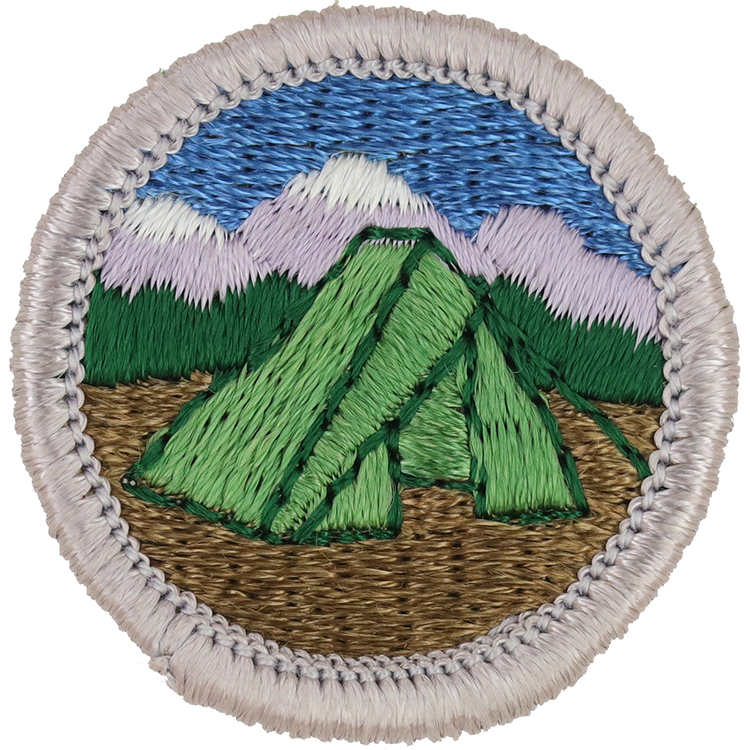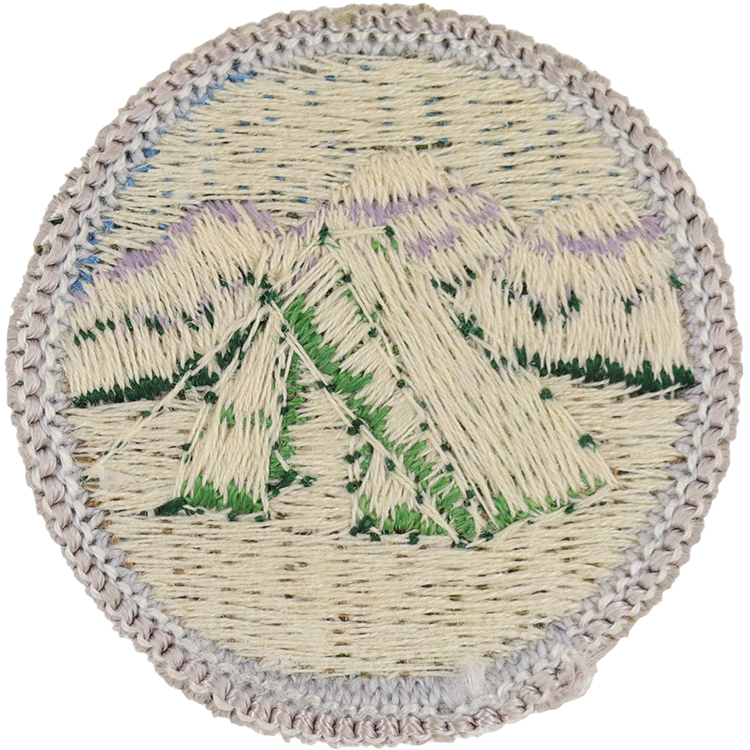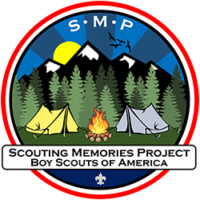
Fig. 1: Campin-G-Front
- Embroidery: Cotton thread
- Border: Merrowed

Fig. 2: Campin-G-Reverse
- Back: Starched cloth
Item Name: Camping 1969 - 1972
Item ID: Campin-G
Collector Rating: 1
Requirements September 1967 until June 1972
Complete First Class Tests 1 and 2
1. Make a layout of a typical patrol or post campsite. Include location of cooking facilities, dining fly, latrine, and at least three two-man tents. Explain how and why weather, season, and water supply are taken into consideration when choosing a site. Also explain what precautions are necessary with regard to safe water, sanitary facilities, and emergencies.
2. Make a written plan for getting to and from a campsite on foot or by vehicle.
3. Make a simple chart showing how a typical patrol or post is organized for an overnight camp. Include assignments for each member of the patrol or post.
4. Prepare a checklist of clothing you would need for an overnight camp in:
(a) Summer
(b) Winter
Discuss with your counselor the types of footwear for various weather conditions. Explain proper care of the feet.
5. Describe at least four types of packs, stating their advantages and disadvantages.
6. Prepare yourself for an actual overnight camp with your patrol or post by doing the following:*
(a) Make up checklists of necessary personal equipment and patrol or post equipment.
(b) Prepare a satisfactory lightweight overnight camp menu suitable for the time of the year with recipes and food list for your patrol or post, listing foods obtainable from your local grocery store or supermarket. Include two breakfasts, three lunches, and two suppers (some canned foods may be used).
(c) Assemble and pack your personal gear and your share of the patrol or post equipment and food for proper carrying and protection against bad weather. Point out how your pack conforms with good practice with regard to items needed first, comfort, minimum weight, balance, size, and neatness. Explain how rest of patrol or post equipment and food is distributed among members.
(d) Show proper method for packing your full equipment on a pack frame, using a diamond hitch or other suitable hitch.
7. Complete the following while on an overnight camp:
(a) Present yourself with your pack to your counselor or Scout leader for inspection, correctly clothed and equipped for an actual overnight camping trip.
(b) Working with a buddy, properly pitch an acceptable two-man trail tent with consideration for weather and terrain. On this campsite, where permissible, construct a field latrine suitable for your patrol or post. (Where not allowed: e.g., State parks, etc., describe method of construction.)
(c) Make a comfortable ground bed and use it for 2 nights. Use ground cloth and padding of clothing, pack, grass, leaves, or straw. Do not use materials from live trees or shrubs.
(d) In areas where permitted, build up a fireplace area of nonburnable soil, dug from your patrol or post latrine hole. Demonstrate proper use of woods tools in securing and preparing fuel for cooking fire. Show how, on a rainy day, you would secure, prepare, and protect your firewood and how you would properly prepare a meal under these conditions.
(e) Build three types of top-of-the-ground fires, using charcoal for one. Show how to extinguish a fire properly. (Where open fires cannot be built, demonstrate how to build fires in the established camp stove.)
(f) Show the proper methods for protecting your camp including food and equipment against animals, insects, and wet or adverse weather. Discuss with your counselor how you would protect yourself against varying weather conditions if caught out on the trail with only a pocketknife.
(g) Strike camp, folding or rolling your tent neatly for packing. Pack all gear and equipment and leave a clean campsite. Demonstrate proper way to dispose of garbage and rubbish.
8. Give evidence of camping experience as follows:
(a) Camp out a total of at least 20 days and 20 nights, sleeping each night under the sky or under a tent you have pitched.
(b) On at least one of these camping trips, hike not less than 1 1/2 miles each way to and from your campsite, packing your personal gear plus your share of patrol or post equipment and food. (This hike is in addition to the ones required for Second and First Class ranks.)
(c) Serve as one of the cooks for your patrol or post for at least five meals prepared on the campsite.
9. Discuss with your counselor how the experiences you have had in earning Camping merit badge have taught you personal health and safety, survival, public health, conservation, and good citizenship.
*May be an individual patrol or post camping trip or part of a regular troop camping trip.
1. Tell what preparations to make, what equipment to take, and what kind of campsite to pick for a safe and successful camp.
2. (a) Take at least two camping trips of not less than 24 hours each with your troop, your patrol, an adult, or another Scout who is at least First Class.
(b) Before each camp submit a camp plan for approval (unless this is a troop camp) to your Scoutmaster or an adult assigned by him.
(c) Before leaving on each of these camping trips, present yourself for inspection suitably clothed for the locality, season, and weather and equipped for the occasion. (d) On at least one of these overnight camps, carry on your back, for a distance of not less than 1-1/2 miles, a pack containing your personal equipment and your share of common camping equipment and food. (e) Pitch a tent correctly and use it for shelter during your encampment. (f) Make a ground bed and sleep on it. After striking camp, repack your gear and carry it out at least 1-1/2 miles. (g) On each of these camping trips, follow proper sanitation practices and safety precautions and leave a clean camp.
Throughout this experience the boy is to use only food and equipment that have been carried to the site on foot. It would defeat the purpose of this test to bring in extra food and equipment by some other means of transportation, such as auto, boat, or burro. The tent pitching is included so that every First Class Scout will have experience in the use of tentage, even though the climate of his area may not require such use.
(h) On at least one of these overnight camps, prepare from raw, dried, or dehydrated ingredients and cook over a fire in the out-of-doors a complete dinner or supper of meat (or fish or poultry), vegetable, dessert, and bread (or biscuits or twist). (i) Clean up afterward, properly dispose of garbage and trash, put out your fire, and leave a clean camp.
To meet this test, a boy may cook for himself, for himself and a buddy, or for his patrol.


